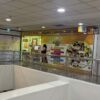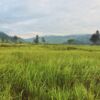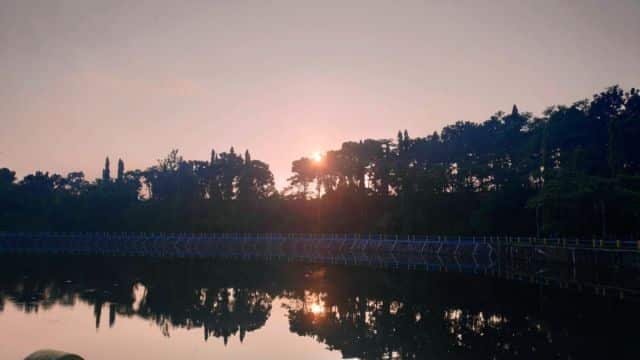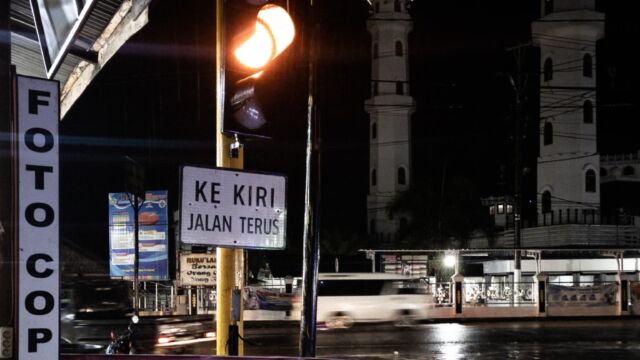Finding Myself (and Others) in a Yogyakarta Coffee Shop
Photo: Rangga Pratama Yudha/Unsplash
Dasmu Works café | 2,500 words
Translated from Bahasa Indonesia by Mikael Johani
I opened Google, searched my name.
The search results should show the real me, I thought.
I scrolled down the page, skim-reading the titles of articles with my name on them. Then I let out a huge sigh.
I looked around the cafe I used as a de facto office, called Dasmu Works. No one here. The clock on my laptop screen showed 8:18a.m, too early even for Yogyakarta’s coffee addicts—Indonesian coffee culture tends to begin mid-morning. There was only me and two baristas who were busy wiping mugs and glasses and folding paper napkins. Intermittent ‘dings!’ indicated incoming online orders. Two ceiling fans furiously circled overhead, helpless against the dense clouds of cigarette smoke blowing out of my mouth.
I stared at my search results again.
If they were indications of myself, then who, really, am I?
*
Once I realized I could do my editing job wherever I could plug in my laptop, I became a wanderer, moving from cafe to cafe in the area where I lived. For a long time, though, I couldn’t find one where I felt totally comfortable ensconced for hours in front of my laptop screen.
Until one day a barista friend of mine told me about a new cafe that he promised was both fun and different: Dasmu Works.
Dasmu was located on Jalan Kaliurang, in the north of Yogyakarta, secluded enough to escape the city’s cacophony of revved-up scooter engines and deafening car horns.
From the first moment I stepped onto the cafe’s ornate tiles, I felt at home. Its grungy garage style was incongruous given it was attached to the luxurious mansion of its owner, but the setup never failed to impress. Once you stepped past sturdy steel gates, decorated with hanging pot plants, you were greeted by quite a spectacle: the skeleton of a once luxurious J20 Gladiator jeep, converted into a small bar. Here the baristas pumped out their coffee creations every morning.
Tables and chairs were arranged neatly next to the Gladiator. There was one long communal table near the back wall. On teak tables further out, the gamers liked to hang out. Right in the center of the garage were two brown tables surrounded by more chairs. Here the college students sat to do their group assignments. People were encouraged to mingle but there was enough space in the cafe for the loners as well.
I chose a corner to the left of the entrance as my spot. Sitting facing the door, I could see everyone coming in, watch what they were doing, and hear what they were saying, without feeling like I was being watched myself. I preferred being on my own, back then. I only wanted a space to work and drink my endless cups of coffee. This was my routine at Dasmu—until the pandemic.
People have said that the pandemic offered much-needed time to recalibrate ourselves; to learn; to grow: that it has been a time to discover who we really are. I believe them. It happened to me at Dasmu Works.
*
Like it or not, the pandemic messed with everyone’s routines, mine included.
In the first six months, as the phrase ‘work from home’ entered everyday usage, I had to confine myself to my kost room and stopped myself from going to Dasmu.
I spent most of my days at my desk, staring at my laptop screen, every now and then walking the few paces to my bed to take a nap. Or two. Or three. The only distractions were the Zoom meetings, which zapped so much of my energy. I could still order coffee on the GoFood app, brought to me via motorbike, but shorn of the daily happenings at Dasmu, I felt empty. An emptiness that made me sick to my stomach.
So one cloudy day, I decided to risk it, and—with my mask on—I went back to Dasmu.
What happened then was a bit of an anticlimax. The old baristas had gone, new ones smiled as they saw me coming in, but I couldn’t see their faces behind the masks. Dasmu wasn’t fun anymore. It felt like it had lost its sense of self, lost its soul.
This was my new normal — long chats over coffee with the baristas and other customers at Dasmu. There was never a day without me listening to people.
Dasmu’s owner, Yoga, knew he had to do something to bring back the magic of the place. He started small by rearranging the tables and chairs. He got rid of my favorite table and replaced it with a bigger one that could fit at least four people. Yoga knew the old Dasmu was a place where people could go whenever they needed to feel less lonely. He wanted that old place back.
Yoga also reactivated Dasmu’s social media to promote its new, more communal concept. They started offering generous discounts on their menu too, something I lapped up instantly.
Yoga’s efforts didn’t go to waste. One by one, people began coming back to the cafe. Some new faces, and many old regulars who had missed the place as much as I did.
Seeing those old faces was the perfect panacea for my pandemic loneliness.
Before this point in my life, I had thought of myself as antisocial. I never wanted to open up to other people, never wanted to meddle in other people’s business. Being chatty would only expose me, I thought: I was afraid people would clock how fragile I was. But my return to Dasmu changed almost everything.
One person I was very happy to see again was Al, one of the cafe’s earliest baristas, who had returned after a sojourn in Bali. Al knew right away the pandemic would lay waste to tourism on the island. Before the government started imposing provincial border controls, he made his way back to Yogya and got his old job back at Dasmu two months after the first identified COVID case in Indonesia.
At first, we just chatted as usual. Al asked how I’d been coping with the pandemic, and I gave him short but friendly answers, not expecting the conversation to go beyond niceties. But Al kept going. He said he had come back to Yogya only a day before Bali airport was closed down and that on the way here he had felt especially anxious. For a barista like him, Yogya offered him little space to grow. In Bali not only had he trained himself to become a first-rate latte artist, he also used his spare time to learn more about growing coffee beans and the ins and outs of the coffee industry. Al’s story intrigued me. And I felt like I was meant to be there for him, to listen when he needed to get things off his chest.
My conversation with Al opened me up as well. The old, closed-up, antisocial, bad listener me was suddenly gone. Others joined us at our table. Everyone wanted to tell each other the same thing: we’re all in this together. People listened, absorbed what the others said: no-one judged. That was when I realized Dasmu had rediscovered its old soul: to be a safe space for people to tell their stories, whatever they might be. And this time, I was one of them.
People coped with the pandemic in different ways. Chatting with another barista at Dasmu, Bayu, reminded me of this. Bayu doubled as a cook. We often had a yarn after he’d whipped up another order of crispy egg mushroom in the kitchen—my favorite. Out of all the baristas at Dasmu, I talked to Bayu the most. Sports updates, gossip—we never ran out of topics. I always remember his advice on how to keep oneself sane during the pandemic: “There’s only one thing to do, bro. Chillax.”
How could you chillax when so many people were dying? Bayu explained it to me. We’ve all been forced to live a fast-paced life with no allowances for mistakes or failures. The constant rush is what makes us exhausted all the time, and why it’s so easy for us to become jaded. But not everyone is cut out for the rat race. Then the pandemic came and everyone was expected to adjust to new habits, a ‘new normal’, in the blink of an eye. ‘Whatever we do, chillax, bro,’ Bayu said.
This was my new normal—long chats over coffee with the baristas and other customers at Dasmu. There was never a day without me listening to people.
I also chatted with Rangga, who like me always began his day with an Americano. He was also a regular, though not an OG like me.
Rangga was a young lecturer at one of Yogya’s universities. He always sat cross-legged, showing off his neon white New Balance sneakers which contrasted nicely with his black jeans. He told me it had taken him a long time and a lot of effort to get where he was. He recounted to me the long and unnecessarily complicated recruitment process at his university. He was an idealistic, tech-savvy young man. He had assumed the internet would bulldoze all remnants of bureaucratic pedantry. But he had been wrong. The old guard at his university had prevailed. His idealism was soon tempered by frustration.
I didn’t understand much of Rangga’s bureaucratic drama, but I kept my ears open; I listened, and I tried to understand. Rangga also told me that he had dreamed of becoming a lecturer so he could find a safe space where people are free to discuss what they want. He said he had only found a space like that in tutorial rooms, and at Dasmu Works.
These conversations made me realize that people are only able to become themselves by making conscious decisions about their lives and sticking to them. No regrets. It also made me think: have I found my real self?
I started sitting at the long table where the students did their homework every time I came to Dasmu. I wanted to hear more stories from more people.
*
One day at Dasmu I met Mega, a friend who was also a long-time regular at the cafe. She studied psychology and loved quoting famous psychologists when she talked. She was very passionate, which you could instantly tell from the way she spoke, the aggressive lilt in her voice, her dramatic hand gestures.
I was eavesdropping on her conversation at the table next to mine, about how we should give ourselves rewards when we accomplish something at great cost. I found her spiel so interesting I decided to join her table.
Sometimes listening to Mega speak transported me back to a university lecture room, without the feeling of being lectured at. Mega was a genuine storyteller, she quickly turned her listeners into awestruck children. She also looked like a proper psych lecturer: young, bespectacled, calm, but with a fire inside her that lit up whenever she was moved by a subject.
I found myself disagreeing with some of what Mega was saying, and I told her in no uncertain terms. For her, everyone deserves ‘self-reward’, even for something as seemingly banal as completing your daily tasks. The self-reward can be as simple as a good rest, having someone else tidy up your house, or a spot of gardening, if that’s your hobby. I said the reality was different, that most people now thought of self-reward as expensive holidays to popular, Instagrammable tourist meccas.
Mega didn’t disagree. She said, thanks to social media, people now valued self-actualization over everything. ‘“I post, therefore I am,’” she said. This new way of thinking drove people to identify self-reward with consumption.
Our conversation went on in this fashion until late. By the end, our table was a mess of half-drunk Americano cups, emptied clear-plastic cups used for iced coffee, more cups of con hielo, and half-eaten plates of fried banana, a favorite at Dasmu.
One day Mega got everyone to talk about selfhood. A heavy topic, yet Mega made it fun. She asked me, ‘Hey, you’re an editor, what’s the opposite of “finding yourself”?’
I racked my brains trying to find an answer. No one had ever asked me the question before. ‘No idea…,’ I said after a few seconds.
‘The opposite of finding yourself is…’ – a pregnant pause before her punchline – ‘finding yourself… asleep at the wheel!’ She roared with laughter.
Two things that stayed with me from this talk with Mega were her concepts of the ideal self versus the real self.
Finding yourself, Mega said, requires one’s ideal self and real self to be in sync. The ideal self, according to her, is tied up with self-actualization. ‘It’s how we want to be perceived by others,’ she said. The real self meanwhile is the truest picture of ourselves: how we act, think, and feel. Mega said we have to be careful to not let a yawning gap form between the ideal self and the real self. ‘If your ideal self is too inflated, not even in the same ballpark as your real self, you could turn into a very manipulative person since you believe you can do everything and that everything you do is always right. The truth is usually the opposite,’ she said.
I asked Mega how someone can get access to this real self, when you probably need the eyes of others to see it, and what they see is more often not the real self, but the ideal one that we project.
‘This is why we need balance,’ Mega said. “If your real self can keep up, then you might be persuaded to seek other manifestations of the ideal self. Human beings always have a desire to progress, to seek a new and better life.’”
I stared into the distance thinking about her answer. The leaves on the hanging pot plants moved up and down from a slight breeze as if in slow motion; people reached for their coffee cups slowly; even the soft drizzle seemed to take its time to come down to earth. My reverie was broken by the sluuurp of coffee on waiting lips, slow and full of pleasure. Suddenly everything was at a normal pace again, including the dulcet voice of Tulus singing his massive hit ‘Don’t Love Me The Way I Am’ blasting from the cafe’s Harman Kardon speakers. The lyrics seemed to underline what we were talking about.
Don’t love me the way I am… don’t…
Be a demanding lover, love needs a trigger…
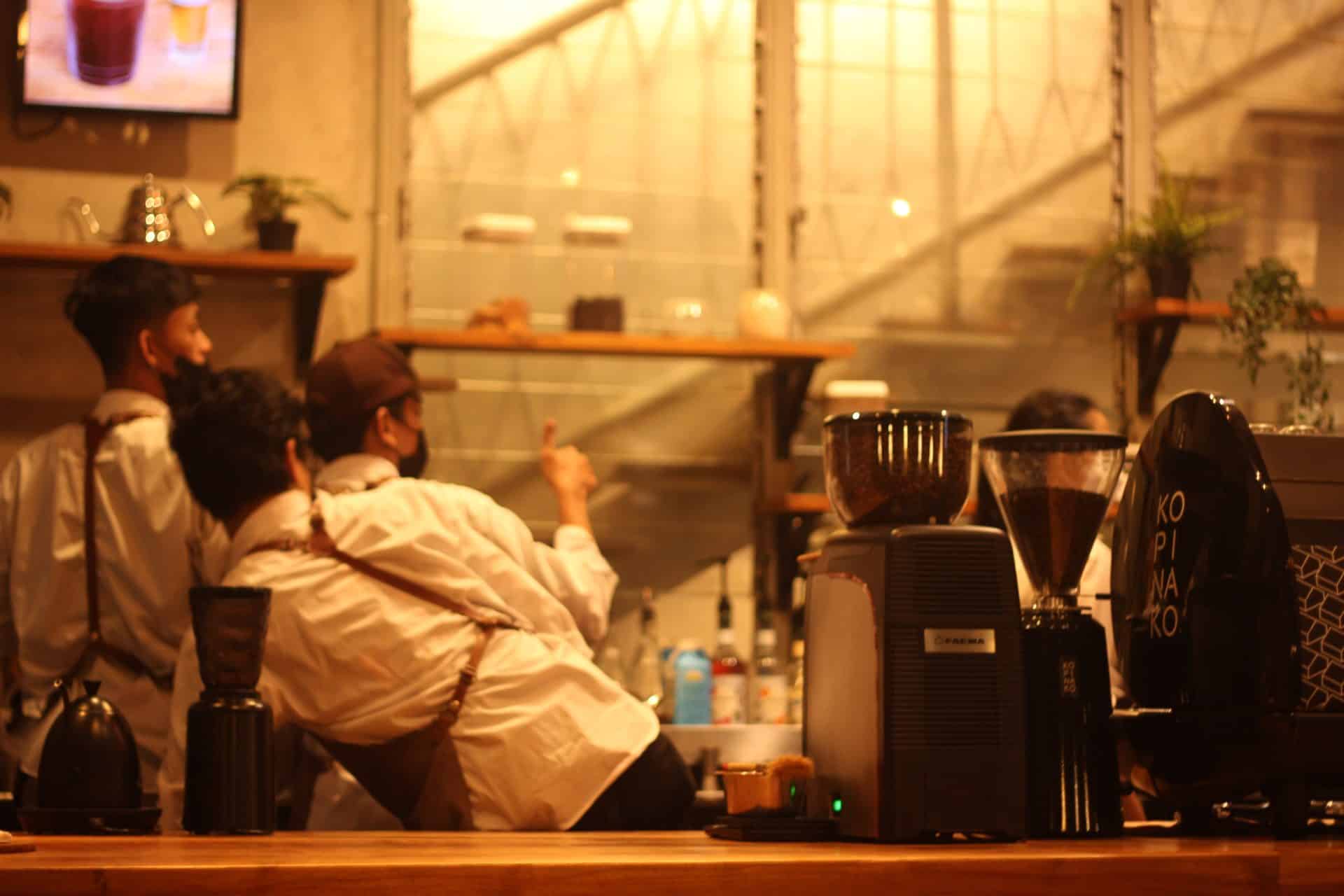
‘Once you’ve reached that balance between real self and ideal self, you will find your comfort zone,’ Mega told me. ‘A comfort zone that doesn’t just make you feel safe, but also inspires you to grow. Once you’ve found your real self, you will want to keep growing.’
I let out a long sigh and took a sip of my Americano. It was already cold. I stared at my reflection in the half-empty cup.
I will always remember that day as the day I started trying in earnest to find my true self, and accept it as it is. Fragile, incomplete, with all its fading desires. It all began in a cafe converted from a car garage.
© Wahyu Nur Cahyo
English translation © Mikael Johani


